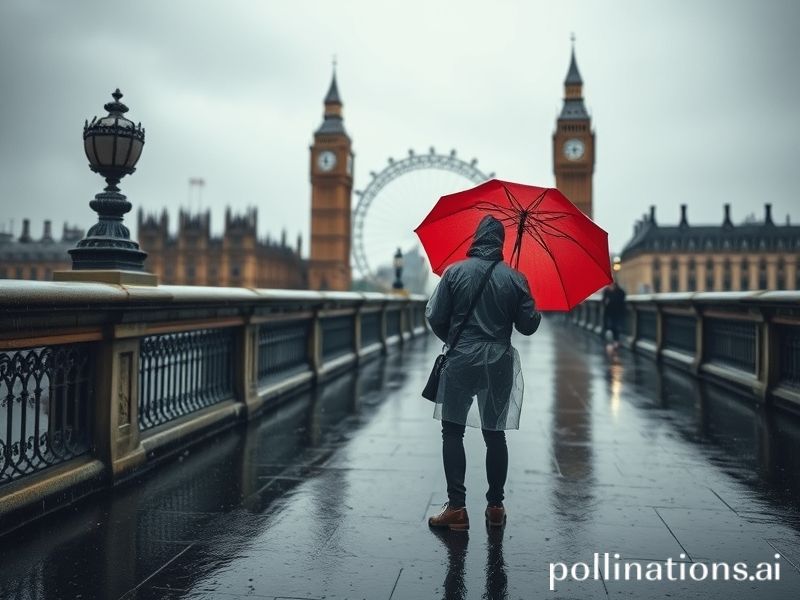Why Britain’s Drizzle Dictates Global Wheat Prices and Kremlin Budgets
Grey Skies, Green Reckonings: Why the UK’s Next Rain Shower Is the World’s Business
By Our Correspondent in a Café That Still Thinks Espresso Is Foreign Muck
LONDON—The Met Office has spoken, and the verdict is vintage: low pressure slouching in from the Atlantic, temperatures clinging to the low double digits like a worried parent, and enough drizzle to make even stoic cats question their life choices. To the average Briton, this is merely Tuesday. To the rest of the planet, it is a geopolitical mood ring.
Consider the global dominoes. A wetter-than-usual May in the Home Counties means UK wheat yields will shrink by roughly seven percent, which is just small enough for Westminster to ignore and just large enough for Egyptian millers to notice. Cairo’s state buyers, already juggling a currency that has the structural integrity of damp cardboard, will pivot to Russian grain—handing the Kremlin another few million dollars to keep drone production humming along nicely. Somewhere in the Black Sea, a captain renames his bulk carrier “London Fog” for the sheer irony of it.
Meanwhile, the same Atlantic storm track that gifts Britain its horizontal rain is busy churning sea surface temperatures in the Gulf Stream. NOAA satellites—those silent, taxpayer-funded voyeurs—report an anomalous cool patch south of Iceland. That flirtation with a slowdown in the North Atlantic Current has Brussels scribbling contingency plans for a European deep-freeze circa 2035. Berlin’s energy strategists, still scarred by the great Vladimir-approved gas embargo of 2022, are quietly reopening coal mines whose names read like heavy-metal albums: Hambach, Garzweiler, Absurdity.
Back on the soggy island, the immediate implications are, of course, domestic and farcical. Wimbledon will deploy its £85 million retractable roof with the solemnity of a missile launch, while Glastonbury’s mud will achieve the approximate viscosity of ideological Twitter discourse. Insurance adjusters have already started pre-emptive therapy. Yet zoom out: the festival’s 200,000 attendees fly in from 97 countries, burning aviation fuel measured in small African economies. Their carbon guilt arrives ahead of them, like duty-free perfume.
The City of London, ever the barometer of collective neurosis, is pricing “weather risk” into every commodity derivative that isn’t nailed down. A hedge fund in Mayfair is long on umbrellas, short on rosé futures, and praying the Gulf Stream behaves like a civilised current instead of a drunken serpent. Analysts there speak of “UK precipitation volatility” with the same hushed awe usually reserved for North Korean missile tests.
Further afield, the monsoon bureaucrats of New Delhi watch satellite loops with a mix of schadenfreude and professional solidarity. At least their deluge is honest, they mutter; Britain’s rain is passive-aggressive. In California, where drought has become a lifestyle brand, influencers post screenshots of the UK radar under captions like “Send us your weather, we’ll trade you avocados and existential dread.” The exchange rate remains unclear.
And so, the forecast: Thursday, bands of rain sweeping eastward, clearing by teatime unless it doesn’t; Friday, a brief flirtation with sunshine, promptly betrayed by showers. It is the meteorological equivalent of a long-running sitcom—predictable, comforting in its mediocrity, and yet somehow syndicated worldwide.
Because the truth, dear reader, is that British weather is no longer a provincial punchline but a planetary dashboard indicator. When the jet stream hiccups here, food prices spike in Lagos. When a stubborn low parks itself over the Irish Sea, LNG tankers reroute from Southampton to Shanghai. The drizzle that soaks your morning commute is simultaneously irrigating geopolitical anxiety on every continent except Antarctica, and give it twenty years—tops—even the penguins will be checking the Met Office app.
So raise a brolly to the grey. In an age of wildfires, coups, and AI-generated pop stars, the UK’s stubbornly temperate misery is the last shared atmospheric constant. The forecast may be grim, but at least it is democratically grim. And in 2024, that counts as hope.







